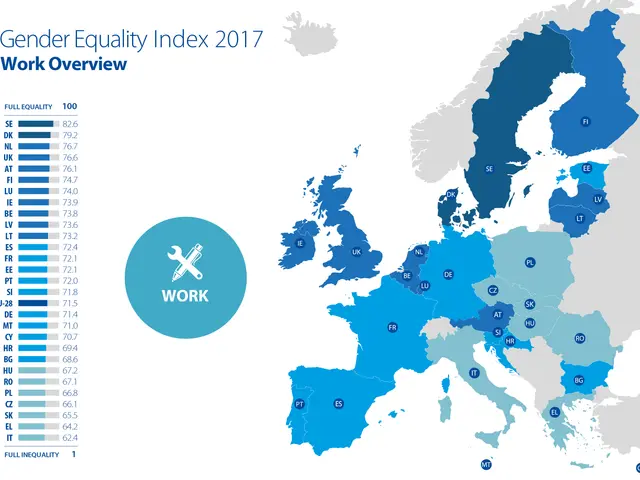Wealth should be utilized for individual and communal prosperity, rather than enriching the already affluent elite.
Rewritten Article:
Let's get real: Whenever you drop a dollar on the Powerful Seven stocks, make a purchase from the largest e-retailers, or shell out that loan interest to a well-known bank, you're effectively enriching billionaires. A mind-boggling fact: if you make $50,000 a year, it would take a whopping 20,000 years to amass that billion without even spending a dime.
According to our annual report released in 2025 on Emergency Savings:
- A staggering 73% of Americans are saving less for unforeseen expenses due to inflation, interest rate hikes, or employment/income changes.
- A whopping 37% of U.S. adults have dipped into their emergency funds in the previous 12 months, as of February 2025.
- 33% of adults have more credit card debt than emergency savings.
The wealth gap seems insurmountable, but here's a silver lining: You can learn to make your money serve your needs, instead of billionaires'. Strategize these four tweaks to reclaim financial power.
Bernadette Joy, a renowned personal finance expert, entrepreneur, and educator, is passionate about helping people achieve financial freedom. As the founder of Crush Your Money Goals®, she's guided countless professionals and business owners towards eliminating debt, growing wealth, and developing financial confidence through her courses, workshops, and coaching programs.
About Bernadette:
1. Keep it local
Gigantic banks don't just store your cash - they use it. In low-yield savings accounts, your funds might be financing big-ticket transactions, lobbying efforts, or high-risk investments that don't benefit you in the slightest.
On the flip side, local credit unions and community banks often prioritize keeping money circulating within your neighborhood's small businesses, home loans, and community development projects.
Last year, I shifted part of my home down payment savings to a local credit union and got a better interest rate on a certificate of deposit than the large national banks offered.
Likewise, when you support your neighborhood coffee shop, bookstore, or family-owned diner, more of your money re-enters the local economy, supporting jobs and helping independent businesses survive.
Your money move: Even transferring 10% of your monthly spending to local merchants can make a significant impact - not just on your wallet but on your community's future.
Want an effortless transition? Move one account - like your emergency fund - to a local bank or credit union in your area. This small change keeps your money local. Just remember to watch the APY - aim for a high yield that also keeps your money circulating in the community.
2. Charity with a purpose
Billionaires are well-known for using charitable giving to secure tax reductions and boost their image – but that doesn't mean it's off-limits for us common folk. It's a powerful financial tool we can all make use of.
For instance, one of my clients organized a charity golf tournament for his youth sports organization. By donating and sponsoring the event, I supported a cause I care about, fostered new business connections, and benefited from a tax break.
One frequently overlooked tactic is donating stocks or other appreciated assets. If you hold an asset that's increased in value, you'll typically owe taxes on the gain. But by donating these assets, the nonprofit gets the full value, and you earn a double financial advantage: a tax deduction and avoiding capital gains tax.
Your money move: Identify three charities that resonate with your values. When you contribute to qualified charities, you're not only reducing your tax burden; you're helping build the world you want to inhabit. That's cash back in your pocket and forward to a cause you care about.
3. Save strategically for wealth-building
Most people store money to cover emergencies, but billionaires hoard cash to capitalize on opportunities when assets plummet in price. While the average American is terrified of a recession, billionaires stash away cash for their next big real estate deal, investment round, or market downturn. They're prepared to strike.
Unlike billionaires, most people lack the financial cushion for quick investment or the high-interest debt to pay off first.
Since becoming debt-free in 2019, I now hold more cash than the median American's bank account balance of $8,000[1]. This gives me the flexibility to seize opportunities when they arise.
Your money move: Create a "wealth-building fund." Begin with an emergency fund of three months' expenses, then, once you're secure, start saving separately for opportunities that strengthen your local economy - like angel investing or supporting community projects.
4. Level up with accreditation
Wealthy individuals have access to exclusive investment opportunities that are beyond reach for the average consumer.
Accredited investors are individuals or entities who earn $200,000 per year or have a net worth of at least $1 million[2]. They can invest in private real estate deals, startups, and other hidden investments, which come with higher risks but potentially higher rewards.
Working toward accredited investor status is like receiving a VIP pass to an exclusive event. You get access to unique opportunities, better insights, and more rewarding experiences.
The goal isn't just to accumulate wealth; it's about making informed investment decisions that align with your values.
Your money move: Don't disqualify yourself. Build a path towards accredited status by boosting your savings rate, eliminating debt, and raising your income. Even if you never become an accredited investor, your financial strategy will be stronger for it.
Becoming accredited may take a decade or more, but it's worth the investment. Today, I invest in small businesses run by individuals I trust, not billionaires.
Final thoughts: Act promptly and with intention
These four moves are crucial shifts that can help redirect your money away from the mega-rich and towards your own goals, values, and future. They have helped me build wealth in a purposeful manner rather than just acquiring more material possessions.
Take one step this week: Open a credit union account. Visit a local business. Set a charitable giving goal for the year. Stack your cash. Your money should work for you and the people you care about - and it can all start today.
References:[1] Federal Reserve Economic Data. (2020). Median Balance of Checking Account by Income. Retrieved from https://fred.stlouisfed.org/series/MSUMCHCKA02825N
[2] U.S. Securities and Exchange Commission. (n.d.). Accredited Investor. Retrieved from https://www.investor.gov/introduction-investing/getting-started/investor-101/investor-protections/accredited-investor
[3] IRS. (2021). Charitable Contributions – Individual. Retrieved from https://www.irs.gov/taxtopics/tc506
[4] Schwab Charitable. (n.d.). How to Donate Appreciated Securities. Retrieved from https://www.schwabcharitable.org/individuals/donate-appreciated-securities.html
- Bernadette Joy, a renowned personal finance expert, suggests that shifting a portion of your savings to a local credit union can provide a better interest rate than large national banks, allowing you to keep your money circulating within the local community, supporting small businesses and community development projects.
- By donating stocks or other appreciated assets to charities, Bernadette points out that, not only can you receive a tax deduction but also avoid capital gains tax, contributing to causes that align with your values while reducing your tax burden.
- Bernadette highlights the importance of building a "wealth-building fund" by first establishing an emergency fund and then saving separately for opportunities that strengthen the local economy, such as angel investing or supporting community projects.
- Aiming for accredited investor status, which requires earning $200,000 per year or having a net worth of at least $1 million, can provide access to exclusive investment opportunities and help individuals make informed decisions that align with their values, creating wealth purposefully rather than just accumulating material possessions.
- To act promptly and with intention towards taking control of personal finances, Bernadette encourages individuals to open a credit union account, visit local businesses, set a charitable giving goal for the year, and intentionally save and invest their money towards achieving their goals and values, all starting today.




